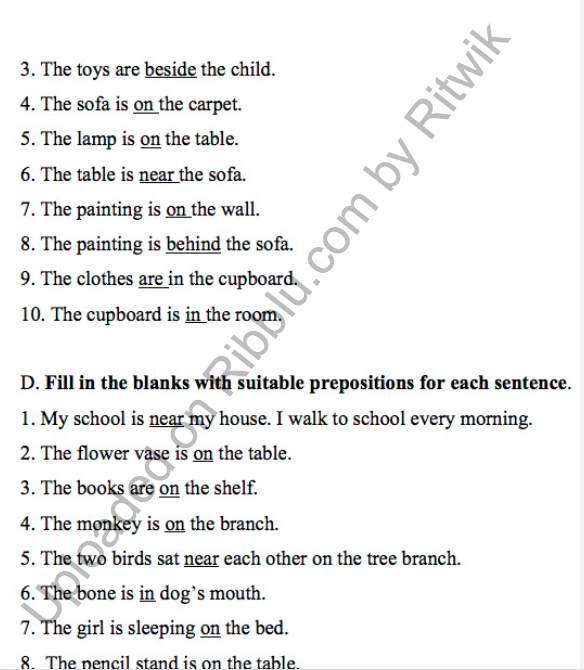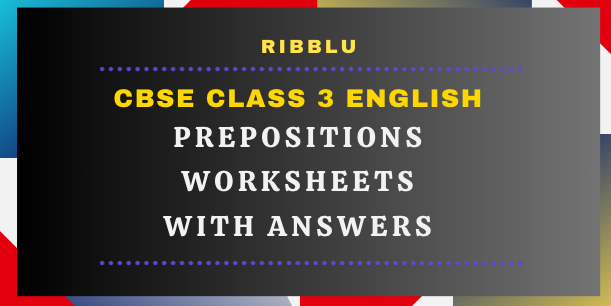A preposition is a word that tells us about a position of a noun. A preposition is a word that tells us about the relation of one thing to another or the position of things. Sometimes the preposition comes at the end of the sentence when the object is a relative pronoun or an interrogative pronoun.
Prepositions Worksheets For CBSE Class 3 in PDF Format
- Preposition Worksheet for CBSE Class 3
- Prepositions Exercise for CBSE Class 3 – Set 2
- Prepositions Exercise for CBSE Class 3
- Identifying Prepositions Worksheets – Grade 3 Grammar
- CBSE Class 3 English The Preposition Worksheet
- Preposition Worksheet Exercises for CBSE Class 3
- CBSE Class 3 English Preposition Worksheet
Preposition Worksheets for Class 3 English
Q.1 Now, write suitable prepositions in the blanks.
- The train leaves ________ 10:00 a.m.
- she is getting married ________ Sunday.
- I usually bathe ________ the morning.
- I will be ________ Ahmedabad on 15th June.
- he lives ________ the USA.
- We often go to Leh ________ January.
- They are coming ________ Christmas.
- My father plays tennis ________ Sundays.
- We won the trophy ________ 2014.
- Can we meet ________ the afternoon.
- my birthday is ________ June.
- My sister’s birthday is ________ 28 January.
- In 2016, I was ______ Class I.
- You should not go out ________ night.
- The film starts _____________ 10:45 a.m.
- Let’s meet _____________ Sunday.
Answers:
- at
- on
- in
- in
- in
- in
- in
- on
- in
- in
- in
- on .
- in
- in
- at
- on
Q.2 Fill in the blanks with suitable prepositions for each sentence.
- My school is near my house. I walk to school every morning.
- The flower vase is on the table.
- The books are on the shelf.
- The monkey is on the branch.
- The two birds sat near each other on the tree branch.
- The bone is in dog’s mouth.
- The girl is sleeping on the bed.
- The pencil stand is on the table.
- The flowers are in the vase.
- The book is near the vase.
Q.3 Fill in the blanks with at, on, after, before, between or behind
to complete the sentence.
- We woke up ____________ midnight.
- My birthday is ____________ the third of November.
- I reach school everyday ____________ 8:00a.m.
- my mother will return ____________ May.
- Some birds come out of their nest ____________ spiring.
- Trees shed their leaves ____________ autumn.
- India became independent ____________ 15 August 1947.
- I will see you ____________ 4p.m.
- November comes ____________ October.
- I will come to the park ____________ finishing my homework.
- The bottle is full ____________ water.
- My school is just ____________ City Centre.
- The Rajdhani Express runs ________ New Delhi and the other big cities of India.
- I will wait for you____________ the bus stop.
- the train will arrive ____________ Platform Number 1.
Answers:
- We woke up at midnight.
- My birthday is on the third of November.
- I reach school every day at 8:00 a.m.
- My mother will return in May.
- Some birds come out of their nest in spring.
- Trees shed their leaves in autumn.
- India became independent on 15 August 1947.
- I will see you at 4 p.m.
- November comes after October.
- I will come to the park after finishing my homework.
- The bottle is full of water.
- My school is just behind City Centre.
- The Rajdhani Express runs between New Delhi and the other big cities of India.
- I will wait for you at the bus stop.
- The train will arrive on Platform Number 1.
Q.4 Fill in the Blanks with Appropriate Prepositions
- The cat is __ the table.
Answer: on - The book is __ the shelf.
Answer: on - The ball is __ the box.
Answer: in - The bird is flying __ the sky.
Answer: in - The fish is swimming __ the water.
Answer: in - The kite is __ the tree.
Answer: behind - The keys are __ the drawer.
Answer: in - The rabbit is hiding __ the bushes.
Answer: behind
Q.5 Choose the Correct Preposition
- The cat is (under, on) the chair.
Answer: on - The flowers are (in, on) the vase.
Answer: in - The book is (beside, between) the two pens.
Answer: between - The ball is (above, below) the table.
Answer: below - The birds are flying (over, through) the clouds.
Answer: through - The butterfly is sitting (on, under) the leaf.
Answer: under
Q.6 Complete the Sentences with Prepositions
- The school bus stops __ the corner.
- The cat is sleeping __ the bed.
- The ball rolled __ the hill.
- I found my toy __ the closet.
- The sun rises __ the east.
Answers:
- The school bus stops at the corner.
- The cat is sleeping on the bed.
- The ball rolled down the hill.
- I found my toy in the closet.
- The sun rises in the east
Q.7 Write a preposition in each blank to complete the sentences.
- The book is __ the table. (on)
- The squirrel is hiding __ the tree. (behind)
- The ball rolled __ the street. (across)
- The kite is flying __ the sky. (in)
- The flowers are __ the garden. (in)
Q.8 Fill in the blanks with appropriate prepositions:
a) The book is __ the table.
b) She is standing __ the door.
c) The dog is running __ the park.
d) He is sitting __ the chair.
Answers:
a) on
b) near
c) in
d) on
Q.9 Choose the correct preposition to complete the sentence:
The flowers are blooming __ the garden.
a) in
b) on
c) under
d) above
Answer: a) in
Q.10 Fill in the blanks with appropriate prepositions:
a) I will meet you __ the library at 5 pm.
b) The children are playing __ the playground.
c) The sun sets __ the horizon.
d) She lives __ the second floor.
Answers:
a) in
b) in
c) below
d) on
Q.11 Identify the incorrect preposition in the following sentence and replace it with the correct one:
The train is going __ the mountain.
a) through
b) over
c) under
d) across
Answer: b) over
Corrected sentence: The train is going over the mountain.
Q.12 Fill in the blanks with appropriate prepositions:
a) The bird is flying __ the sky.
b) The picture is hanging __ the wall.
c) The water is flowing __ the river.
d) They are walking __ the road.
Answers:
a) in
b) on
c) in
d) along
Q.13 Choose the correct preposition to complete the sentence:
I am looking forward to seeing you __ Christmas dinner.
a) at
b) on
c) during
d) before
Answer: a) at
Q.14 Fill in the blanks with appropriate prepositions:
a) The key is hidden __ the drawer.
b) The concert is scheduled __ tonight.
c) The snow is falling __ the ground.
d) She is good __ mathematics.
Answers:
a) in
b) for
c) onto
d) at
Q.15 Identify the incorrect preposition in the following sentence and replace it with the correct one:
He is waiting __ the bus stop.
a) at
b) on
c) under
d) beside
Answer: d) beside
Corrected sentence: He is waiting at the bus stop.
Q.16 Fill in the blanks with appropriate prepositions:
a) The tree is leaning __ the fence.
b) The musician is playing __ the guitar.
c) The cat is sleeping __ the couch.
d) The city is located __ the coast.
Answers:
a) against
b) on
c) on
d) on
Q.17 Choose the correct preposition to complete the sentence:
The company is planning to expand its business __ foreign markets.
a) into
b) in
c) within
d) beyond
Answer: a) into
Q.18 Fill in the blanks with appropriate prepositions:
a) The teacher is writing __ the blackboard.
b) The student is exceling __ his studies.
c) The storm is approaching __ the town.
d) She is interested __ photography.
Answers:
a) on
b) in
c) towards
d) in
Q.19 Identify the incorrect preposition in the following sentence and replace it with the correct one:
They are discussing __ the project proposal.
a) about
b) around
c) concerning
d) regarding
Answer: c) concerning
Corrected sentence: They are discussing the project proposal.

A Few Rules
Prepositions of Direction
To refer to a direction, use the prepositions “to,” “in,” “into,” “on,” and “onto.”
- She drove to the store.
- Don’t ring the doorbell. Come right in(to) the house.
- Drive on(to) the grass and park the car there.
Prepositions of Time
To refer to one point in time, use the prepositions “in,” “at,” and “on.”
Use “in” with parts of the day (not specific times), months, years, and seasons.
- He reads in the evening.
- The weather is cold in December.
- She was born in 1996.
- We rake leaves in the fall.
Use “at” with the time of day. Also use “at” with noon, night, and midnight.
- I go to work at 8:00.
- He eats lunch at noon.
- She often goes for a walk at night.
- They go to bed at midnight.
Use “on” with days.
- I work on Saturdays.
- He does laundry on Wednesdays.
To refer to extended time, use the prepositions “since,” “for,” “by,” “during,” “from…to,” “from…until,” “with,” and “within.”
- I have lived in Delhi since 2005. (I moved there in 2005 and still live there.)
- He will be in Toronto for 3 weeks. (He will spend 3 weeks in Jaipur.)
- She will finish her homework by 6:00. (She will finish her homework sometime between now and 6:00.)
- He works part time during the summer. (For the period of time throughout the summer.)
- I will collect data from January to June. (Starting in January and ending in June.)
- They are in school from August until May. (Starting in August and ending in May.)
- She will graduate within 2 years. (Not longer than 2 years.)
Prepositions of Place
To refer to a place, use the prepositions “in” (the point itself), “at” (the general vicinity), “on” (the surface), and “inside” (something contained).
- They will meet in the lunchroom.
- She was waiting at the corner.
- He left his phone on the bed.
- Place the pen inside the drawer.
To refer to an object higher than a point, use the prepositions “over” and “above.” To refer to an object lower than a point, use the prepositions “below,” “beneath,” “under,” and “underneath.”
- The bird flew over the house.
- The plates were on the shelf above the cups.
- Basements are dug below ground.
- There is hard wood beneath the carpet.
- The squirrel hid the nuts under a pile of leaves.
- The cat is hiding underneath the box.
To refer to an object close to a point, use the prepositions “by,” “near,” “next to,” “between,” “among,” and “opposite.”
- The gas station is by the grocery store.
- The park is near her house.
- Park your bike next to the garage.
- There is a deer between the two trees.
- There is a purple flower among the weeds.
- The garage is opposite the house.
